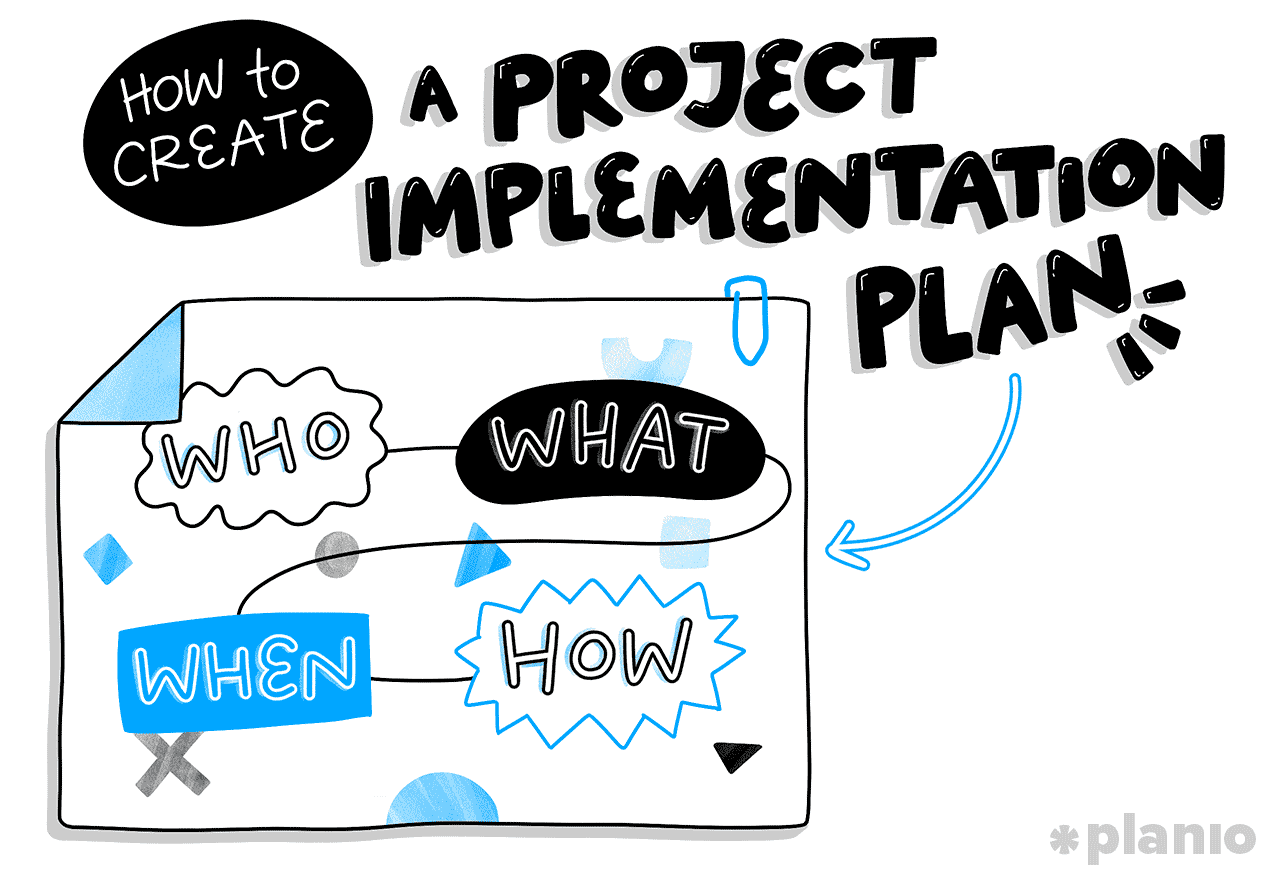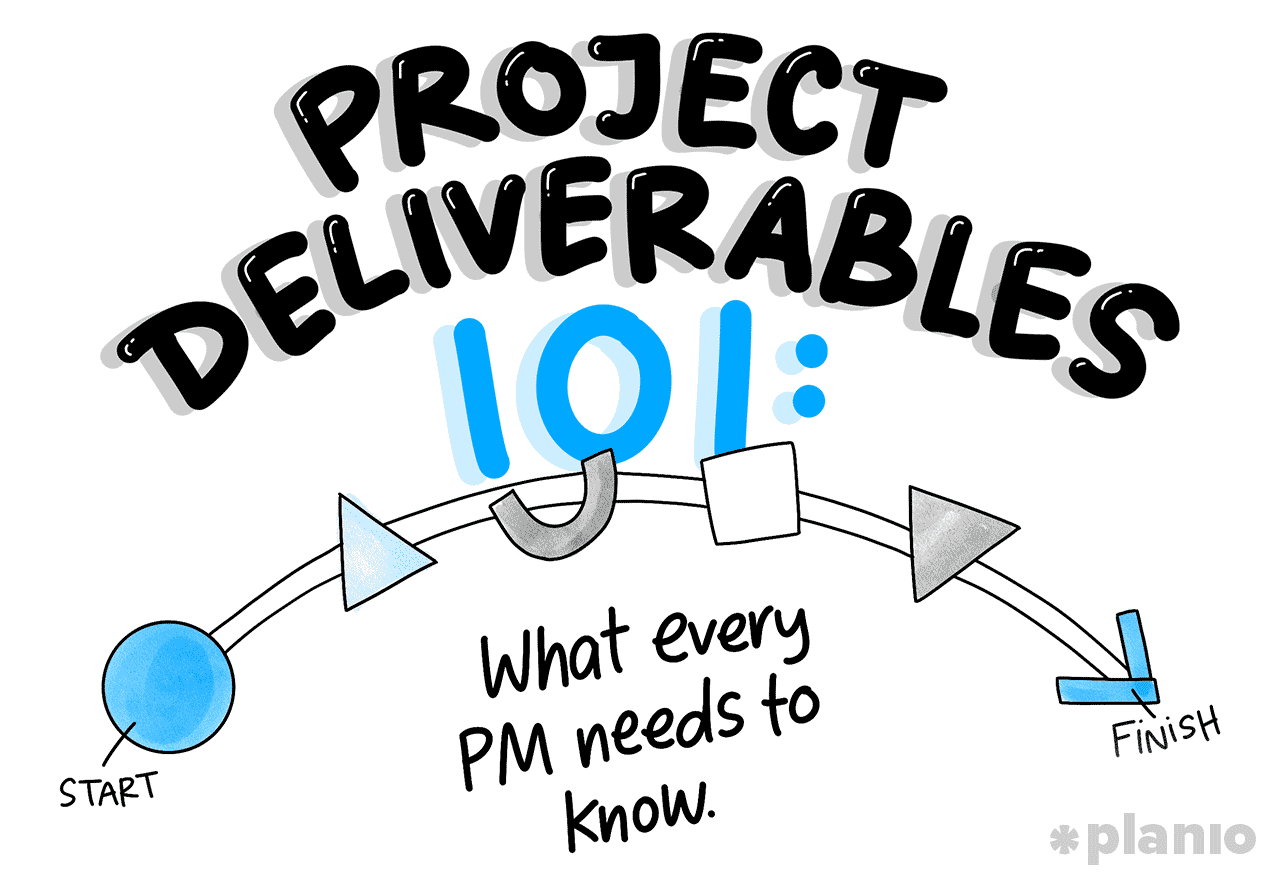What are limiting beliefs? How to overcome them and succeed
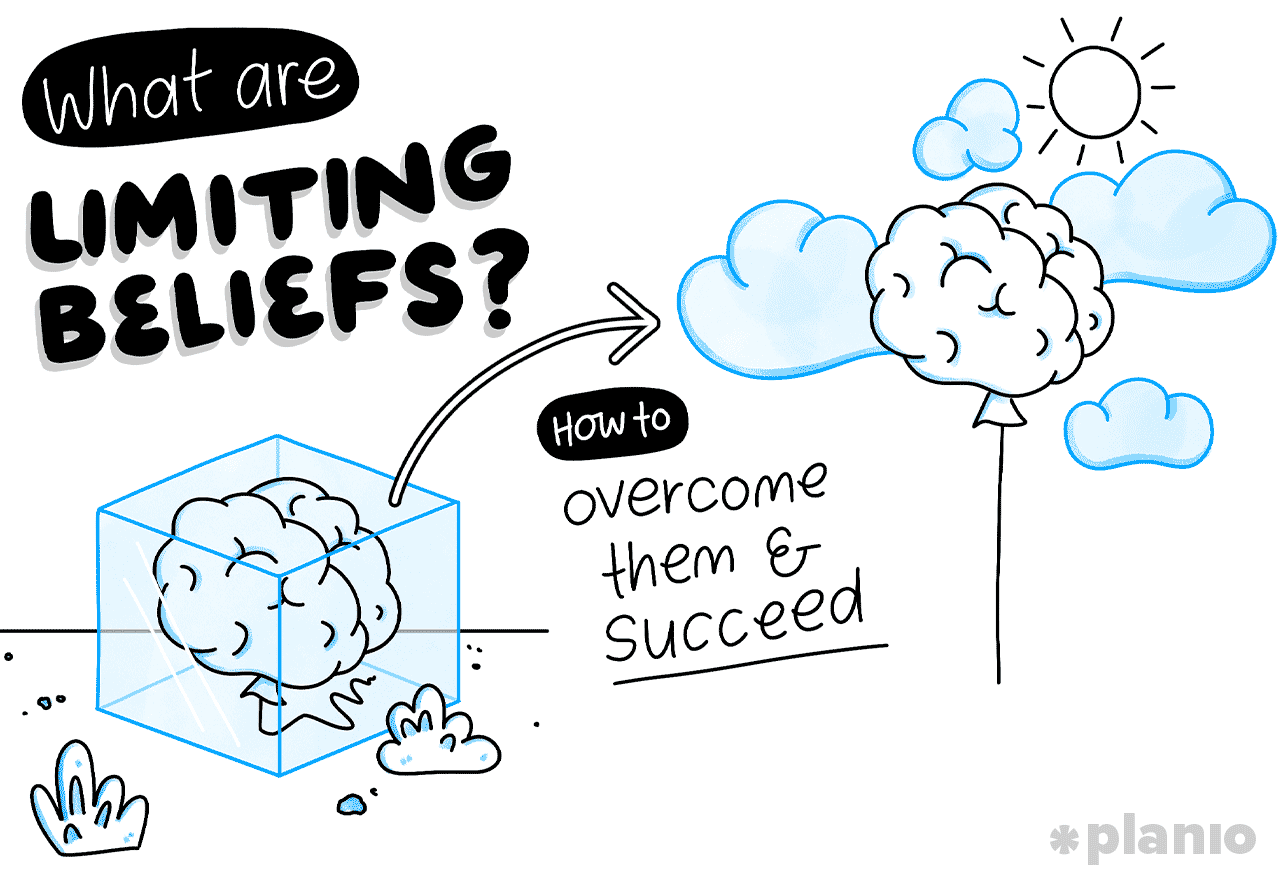
Have you ever had a moment where you doubted yourself? Despite years of knowledge and experience, are you still scared of being “found out?”
While many people refer to this sort of situation as imposter syndrome, there’s actually something deeper at play: limiting beliefs.
Limiting beliefs are false opinions we have about ourselves that hold us back. They can be about anything from our own skills to the kinds of people we want to work with or even the structure of our day.
Limiting beliefs can hold you back in life and work. But as a project leader, your limiting beliefs don’t just affect you — they impact your entire team’s morale, motivation, and productivity. That’s why it’s essential to recognize, understand, and overcome them before it’s too late.
Jump to a section:
In this guide, we’ll dive deep into what limiting beliefs are, what the most common ones are for project managers, and how you can defeat your own limiting beliefs to lead your team towards success.
What are limiting beliefs? How do they cause issues for your team?
Limiting beliefs are thoughts, opinions, or entire states of mind that restrict your ability to live and work the ways you want to. These beliefs are often false and cause you to feel low, kill off your motivation, and negatively impact your productivity.
For example, if you tell yourself you’re “not good enough,” “don’t have enough time,” or “just aren’t confident enough” to do your work.
These beliefs aren’t always about yourself, either. Instead, they might focus on your work environment, your perceived opinions of others, or the broader world around you.
Limiting beliefs are rooted in complex psychology, and often caused by factors such as negative past experiences, imposter syndrome, fear of failure, procrastination, and low self-esteem.
In the project management world, limiting beliefs center around your capability, leading you to question your knowledge, decision-making, and relationships with your team.
Left unchecked, your limiting beliefs may lead to:
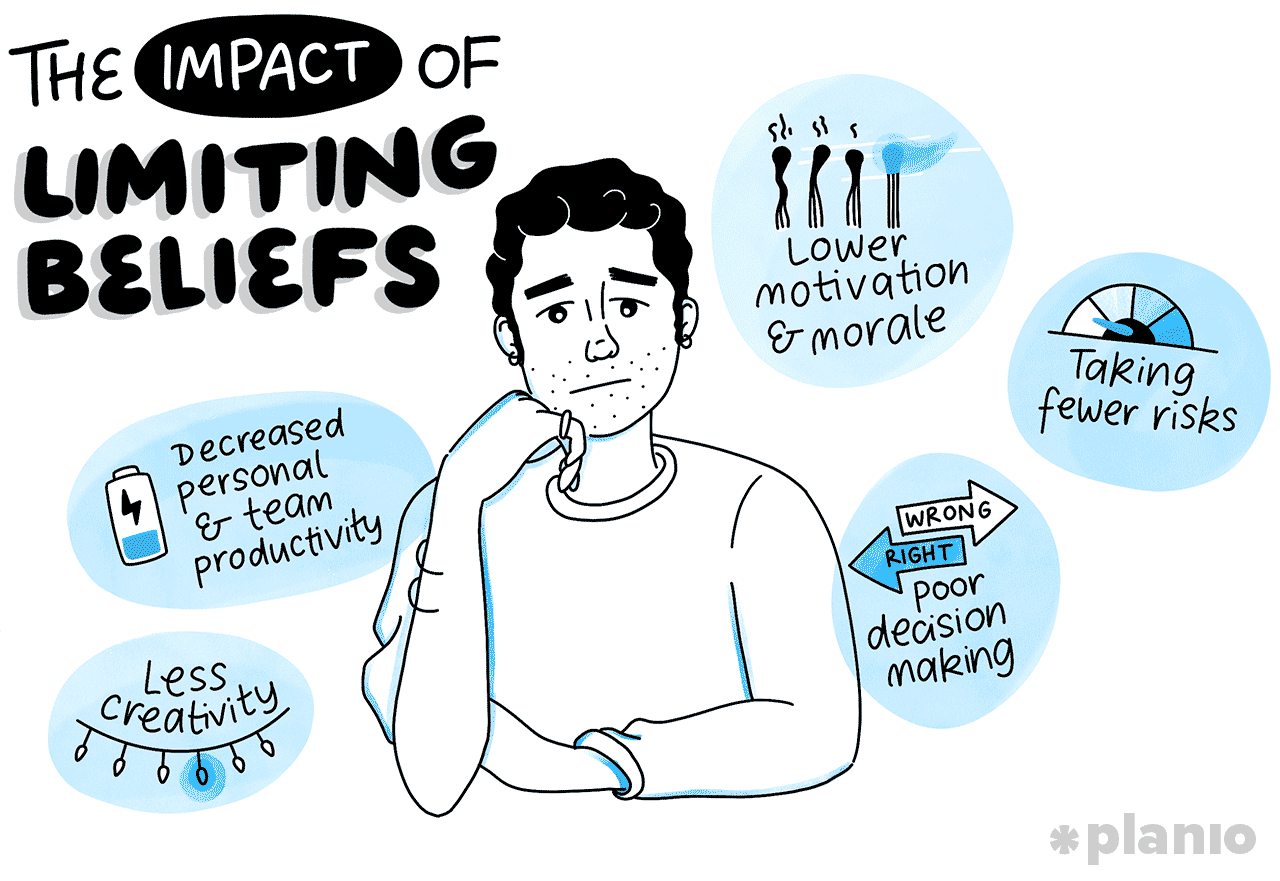
- Decreased personal and team productivity. If you’re battling with your own negative thoughts, you won’t have the headspace to manage those around you effectively. Drop the ball with your team, and there’s a chance your overall project productivity will decrease.
- Lower motivation and morale. A project leader sets the tone in many ways, extending to team motivation and morale. If your limiting beliefs are causing you to feel low, that will rub off on the team, driving down the morale of everyone around you.
- Less creativity. Low mood and productivity go hand-in-hand with a drop in creativity. Especially in product strategy teams, thinking creatively is crucial for generating innovative ideas that set you apart from your competitors.
- Taking fewer risks. While this may read like a good thing at first glance, if your beliefs limit your confidence, you’re less likely to roll the dice and make the big calls that could lead to success.
- Poor decision-making. Where project management differs from project leadership is that you need to have the calmness, confidence, and authority to make the right decisions. If your limiting beliefs are in the way, you risk making the wrong decisions and plunging your project team into disarray.
Limiting beliefs can greatly affect you and your wider team. As we’ll come on to cover, the key is to recognize, understand, and overcome them quickly to limit the impact on those around you.
The 6 worst limiting beliefs for project managers
Now that we know what limiting beliefs are, it’s time to look at some of the more common ones you could face as a project manager.
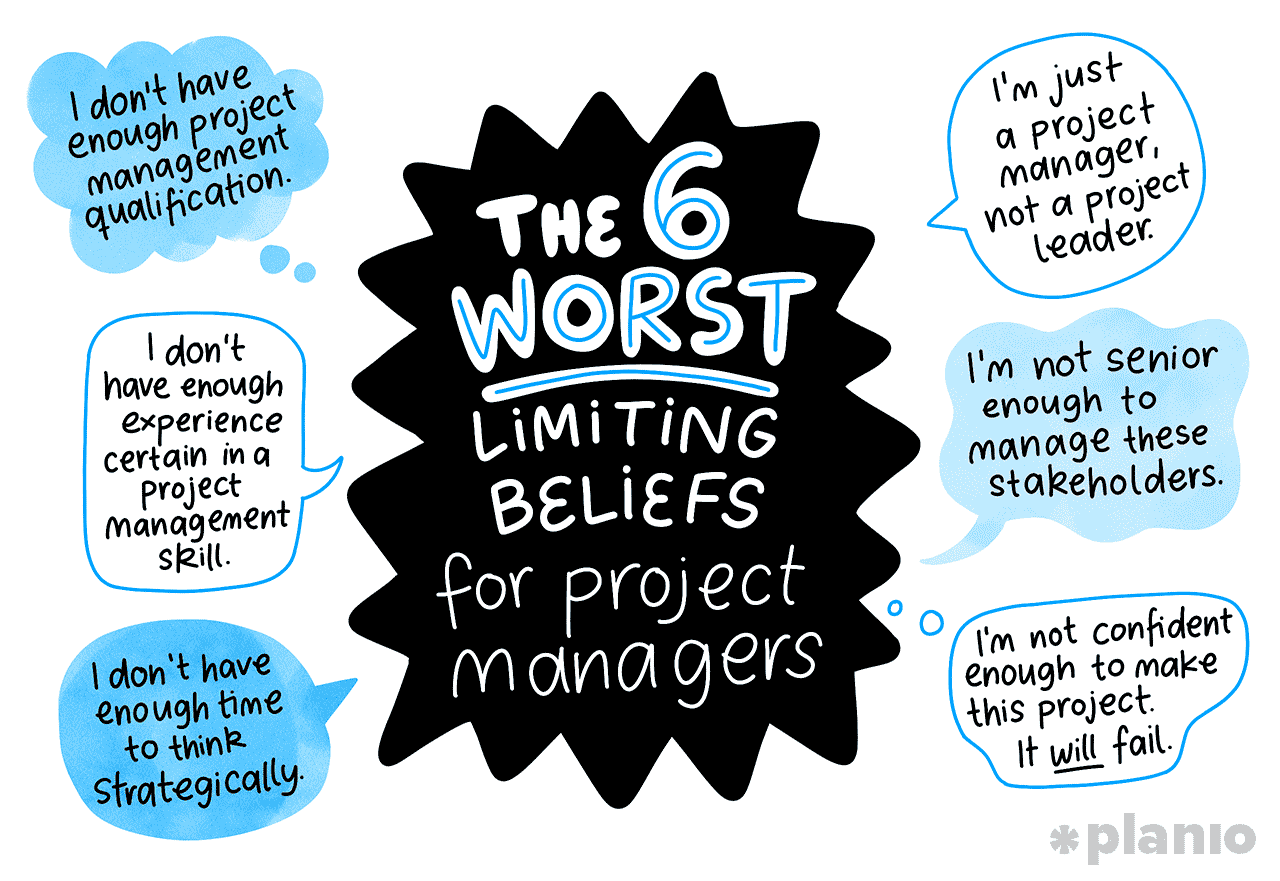
Let’s look at these six in turn, exploring what you may be feeling, why that belief is so common, and the impact it could have if you don’t resolve it quickly.
1. “I’m just a project manager, not a project leader.”
Many people become project managers because they’re structured, well-organized, and great at communicating. But, as you take more senior positions, you’ll naturally become a project leader.
Because we’re flooded with examples of great leaders in areas such as politics, sports, and business, it’s easy to compare ourselves and come to the false conclusion that we’re not fit for the project leader role.
If you keep believing this, your team will suffer as they don’t get the required direction, support, and inspiration. After all, you don’t need to be Barack Obama or Steve Jobs; you only need to be a leader and mentor to your own team!
2. “I don’t have enough project management qualifications.”
Project management is a profession full of qualifications. But, unlike doctors or lawyers, you don’t actually need a qualification to work as a project manager.
In fact, being a great project manager is all about using your own unique management style to guide your project team toward the objective. While most organizations have a general structure for project management, how you execute your project is entirely up to you.
Worry about qualifications for too long, and you’ll miss deadlines, overanalyze decisions, and lose the confidence of your stakeholders.
3. “I don’t have enough experience in a certain project management skill.”
Being a project manager is a varied job. You’ll spend your time juggling many responsibilities, such as jumping from strategy workshops, one-to-one meetings, building release plans, and reviewing your budgets.
Because there’s so much variety, project managers wrongly tell themselves that they need to be the master of everything to have a chance at success. In reality, great project managers utilize the skills of their team and stakeholders to keep things moving smoothly.
If you get fixated on the things you’re weakest at, you’ll dampen the impact of your strengths, and reduce your overall productivity. And in reality, you’re probably not as bad at those skills as you think!
As a project leader, your limiting beliefs don’t just affect you - they impact your entire team.
4. “I’m not senior enough to manage these stakeholders.”
Until the robots take over, the critical component of any successful project is bringing stakeholders together.
As your experience grows, you’ll begin managing bigger and bigger projects and working with more senior stakeholders. Especially when your project sits at the C-suite level, it can be daunting managing demanding characters, leading you to question your own seniority.
There’s a good chance those beliefs are completely false, as you wouldn’t have been handed this project if you weren’t capable. But, if you fail to overcome your limiting beliefs, you’ll lose your stakeholders' trust and your team's control.
5. “I don’t have enough time to think strategically.”
When working on big change initiatives, it can, at times, be hard to see the wood from the trees. Because of this, many project managers think they’re failing because they aren’t being strategic enough.
Especially at the project level, strategic thinking isn’t always required, so there’s a chance you’re worrying yourself over nothing. In fact, strategic thinking is more commonly aligned with program management as projects are often smaller in size, scope, and value.
Spend time working on unnecessary strategy, and there’s a chance you’ll miss what’s right in front of you. That may lead to your team missing deadlines, now identifying critical risks, or falling victim to scope creep.
6. “I’m not confident enough to manage this project. It will fail.”
Projects don’t happen in their own world. There’s a lot that can go wrong, with risks, issues, and challenges around every corner.
As a project manager, you need to have confidence that you can manage the twists and turns and arm yourself with the resilience to keep pushing forward. But resilience is like a muscle that needs strengthening. If you’re stressed, or on the edge of burnout, it can be easy to lose your confidence.
If you believe you’re not confident enough, you risk your limiting beliefs becoming a self-fulfilling prophecy. As a project manager, you must stay focused to keep the team moving toward the objective.
How to get rid of the limiting beliefs that are holding you back
So, you know what to look out for, but what do you actually do when a limiting belief comes into your head?
Let’s find out as we walk through a 6-step action plan you can use to defeat your limiting beliefs before they become an issue.
Recognize your own beliefs and behaviors
To begin overcoming your limiting beliefs, first, you need to identify them. Most of the time, these negative thoughts come into your head during times of stress and discomfort, so keep an eye on your work-life balance.
But this isn’t always the case. Sometimes, limiting beliefs are unconscious and manifest in your day-to-day behaviors. While these can be harder to identify, some honest self-reflection will help you uncover these more profound limiting beliefs.
Actions you can take right now:
- If a negative thought comes into your mind, start by writing it down or saying it out loud to yourself. This helps to make it real and will help you with the next steps in this action plan.
- Reflect on any negative behaviors you might portray, especially at times of stress. For example, do you become angry during conflict? Do you shy away from challenging tasks? Do you only take on easy goals?
A real-life example:
Faith is a project manager at TurboCode, an application development company. Faith is working on a high-profile project and, after only two weeks, has begun questioning her abilities. She’s been having limiting thoughts and shying away from engaging with her project sponsor, regularly canceling meetings, and only communicating via email.
Use the "5 Whys" technique to analyze the cause of your limiting belief
No matter how big or small, your limiting beliefs will always have a root cause.

While there may be some deeper psychological reasons, in most circumstances, limiting beliefs in the workplace stem from a negative past experience, imposter syndrome, or a fear of failure.
With your limiting beliefs identified, the next step is to trace them back to their root cause, understanding where they stem from and what’s caused them to arise.
Actions you can take right now:
- The ‘5 Whys’ technique is a great way to interrogate the initial cause of a problem. It’s really easy, too. Simply ask yourself why you’re feeling the way you are or where your limiting belief comes from, and keep asking why until you’ve reached the root cause.
- Alongside this, uncover whether any evidence actually exists to support your limiting belief. Spoiler alert: in most instances, there won’t be any, proving that it’s just an irrational thought in your mind.
A real-life example:
Faith reflects on the limiting beliefs about her abilities. She identifies something that went wrong in a meeting on her previous project where a stakeholder was rude to her, creating a deeply upsetting negative experience. That same stakeholder works on her current project as the Sponsor.
Get some perspective from the world around you
Limiting beliefs tend to grow and grow in our minds. Once you have an idea in your head, even if you’ve investigated the root cause, it can quickly consume everything you do. This is when limiting beliefs can become dangerous and affect those around you.
A great way to begin dispelling limiting beliefs is to get some perspective by considering your wider environment. Especially in a work setting, it’s easy to forget that there are far more important things in the world than your project, and if things go wrong, the consequences aren’t actually that severe.
Actions you can take right now:
- Reflect on your limiting beliefs, sharing your feelings and the root cause with someone you trust. You can do this with your manager, or if you don’t feel comfortable, try finding a mentor.
- If your limiting beliefs are preventing you from seeing the bigger picture, seek external advice and guidance. We’d recommend checking out our Project Management Survival guide or getting some perspective from failed projects by reviewing lessons learned.
A real-life example:
Faith sits down with her manager to discuss how she’s feeling. Faith’s manager offers some perspective on the situation, reminding her of the success of her previous project despite the negative experience. Faith’s manager also suggests she speaks to another project manager, Jack, who has experience with the same Sponsor and how best to manage them.
Create positive affirmations to change your belief system
Positive affirmations are a silver bullet for defeating limiting beliefs. Affirmations are positive statements that can help you challenge and overcome self-sabotaging and negative thoughts — so they’re perfect for limiting beliefs.
Positive affirmations have the best results when written down and said aloud and are part of many project managers’ daily routines. A great example of reframing a limiting belief as a positive affirmation is:
Turning “I’m not good enough to manage this project” to “I have the skills and experience to manage projects for my stakeholders”.
Actions you can take right now:
- Start by reading the Planio guide on Highly Productive Daily Routines. Alongside positive affirmations, there are some great tips to help you manage stress, improve focus, and fend off burnout.
- Come up with a list of positive affirmations to tell yourself daily. If you struggle or have a mental block, don’t be afraid to ask others for project management feedback to build up a list of your strengths and achievements!
A real-life example:
After meeting with her manager, Faith takes some of the feedback and turns it into a set of affirmations to tell herself daily. Faith focuses her affirmations on confidence, reminding herself of occasions she has effectively managed tricky stakeholders.
If you fail to overcome your limiting beliefs, you’ll lose your stakeholders’ trust and your team’s control.
Test your new beliefs and put plans in place for the future
It’s now time to take your new beliefs for a spin, working with your team to lead and manage a great project!
Armed with your positive affirmations, work at your speed to take on the things you thought you couldn’t do, and watch for evidence of your success. But remember, limiting beliefs can strike at any time, so put good habits and plans in place to prevent triggers such as stress in the future.
Do that, and we’re sure you’ll realize those limiting beliefs were completely false, and you have the power to do whatever you set your mind to!
Actions you can take right now:
- Remember those rituals we spoke about in the previous section? Well, team rituals have the same effect for groups of people, helping you to align on goals, overcome uncertainty, and enhance your team effectiveness.
- Like all things in project management, there’s never a one-size-fits-all approach. You’ll find the right ways to identify, analyze, and overcome your limiting beliefs, so do what works best for you and your team.
- Removing stress is a great way to combat limiting beliefs, and a project management tool is a great way to help keep your project under control in one place. With features for task management, agile planning, team communication, and more, many project managers chose Planio as their trusty tool for delivering amazing projects. You can find out more here!
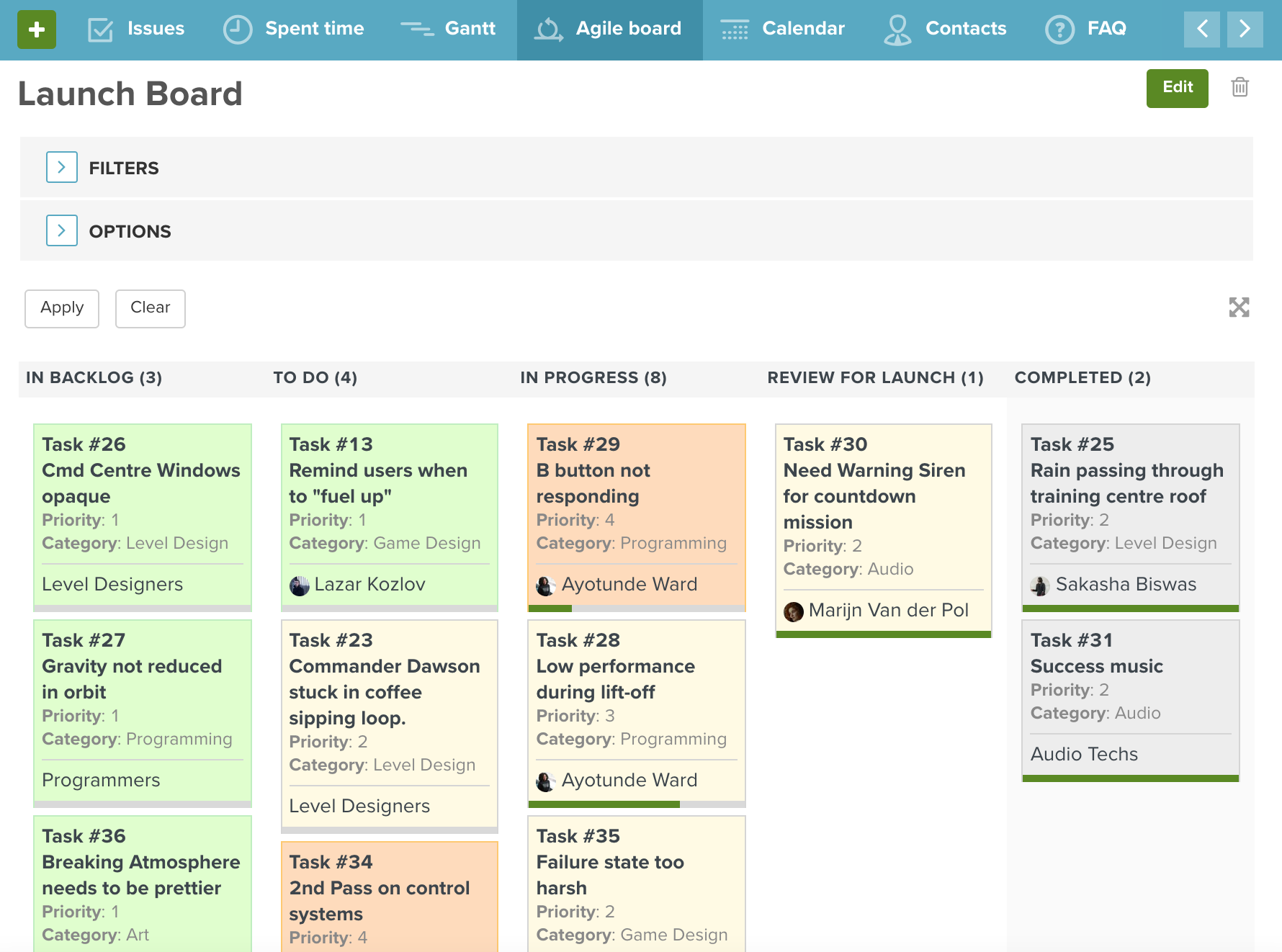
A real-life example:
Faith uses her daily affirmations to build her confidence with her Sponsor. She schedules regular meetings with him and decides to tackle new challenges head-on. The team is pleased with how the project progresses and praises Faith for her strong leadership. Faith also puts some good habits in place for personal organization and time management to help her keep anxiety at bay moving forward.
The bottom line: Don’t let limiting beliefs hold you back
Limiting beliefs are the false opinions we have about ourselves that hold us back and negatively impact those around us. Limiting beliefs can strike at any time, but given the stressful nature of project management, they’re more likely to strike people like you.
But the good news is you’re not alone. The trick to defeating limiting beliefs is identifying them earlier, understanding the root cause, and fighting them off with positive affirmations. Do that, and we’re confident you’ll stay on top form and deliver excellent projects.
Take the stress out of project management. Try Planio free for 30 days (no credit card required!)
